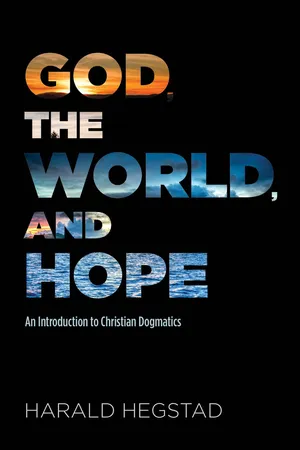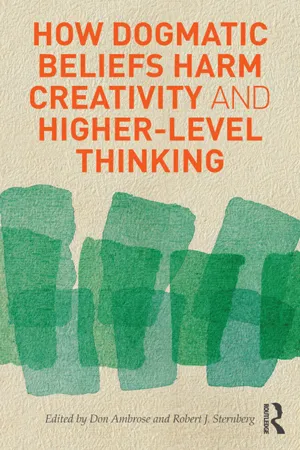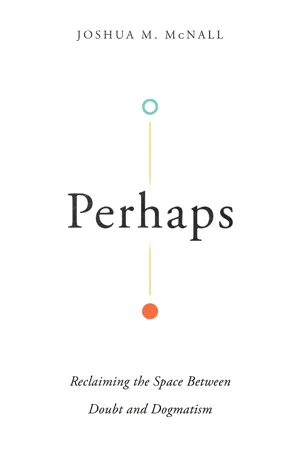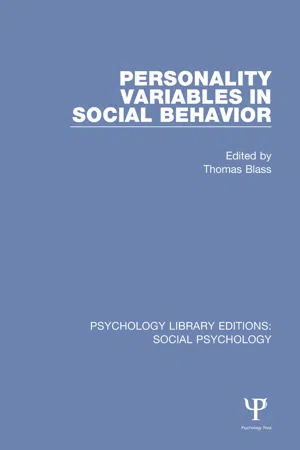Languages & Linguistics
Dogmatism
Dogmatism in linguistics refers to the belief in the absolute correctness of a particular linguistic theory or approach, often without considering alternative perspectives or evidence. It can hinder open-minded exploration and understanding of language, as well as impede the development of new linguistic theories and insights. In language studies, it is important to maintain a critical and open-minded approach to different linguistic theories and ideas.
Written by Perlego with AI-assistance
Related key terms
1 of 5
4 Key excerpts on "Dogmatism"
- eBook - ePub
God, the World, and Hope
An Introduction to Christian Dogmatics
- Harald Hegstad(Author)
- 2018(Publication Date)
- Wipf and Stock(Publisher)
In both tasks, dogmatics will naturally be influenced by the one who formulates the critical and the constructive proposals, so that these often have a strongly personal character; but they must not be understood as the dogmatic theologian’s own personal view of the Christian faith. Dogmatic proposals are not primarily an expression of personal opinions, but an attempt to formulate what can count as an expression of the church’s faith; and their success will depend inter alia on how far they are accepted by the church community. History shows that some dogmatic theologians have been very influential in the church, while others have had a more limited impact. The secondary language of dogmatics differs from the religious primary language not only because it has another location, but also through its form. When dogmatic theologians work on the content of the Christian faith, they seek to formulate this content with the help of concepts and the discussion of the various problems. In this way, dogmatics has much in common with philosophy, which also seeks to formulate the connections in human existence with the help of a theoretically and conceptually precise language. Religious language often has a strongly narrative element: it speaks of events or experiences. Such narratives can also have the form of exemplary stories or myths. The language of dogmatics is more concerned to analyze in a more conceptual vocabulary what such narratives and experiences mean. For example, one central element in religious language is the story of how God intervenes and gives human beings a new life. Such narratives are found both in the Bible and in the experiences of individuals. Instead of simply retelling such stories, dogmatics aims to express such experiences with the help of concepts like “salvation” or “justification.” This does not mean that dogmatics works only with abstract concepts that are detached from concrete experience - Don Ambrose, Robert J. Sternberg(Authors)
- 2012(Publication Date)
- Routledge(Publisher)
A most holy war: The Albigensian Crusade and the battle for Christendom . Oxford, England: Oxford University Press.Passage contains an image
5
Dogmatism, CREATIVITY, AND CRITICAL THOUGHT
The Reality of Human Minds and the Possibility of Critical Societies
Linda Elder and Richard Paul
FOUNDATION FOR CRITICAL THINKING
Dogmatism is a creation of human minds, as are all human thoughts, beliefs, concepts, feelings, and desires. Dogmatism refers to the state of holding to and asserting beliefs in the face of significant evidence against those beliefs (or actively resisting beliefs in the face of evidence supporting those beliefs). It is part of a cluster of pathological dispositions to which the human mind is prone including, but not limited to, closed-mindedness, hypocrisy, conformity, selfishness, myopia, oversimplification, and self-righteousness. Again, each of these mindsets is a construct of the human mind.Every moment of life provides us with opportunities to define (and thus “create”) ourselves intellectually and emotionally—to identify, challenge, and combat our dogmatic tendencies. We have the intellectual potential to construct more than one possible way of experiencing the world. Through critical thinking we can create in ourselves a mind richly grounded in intellectual virtues or, conversely, we can uncritically create a mind trapped in intellectual pathologies. If we choose a life of freedom and self-creation, we see through the many layers of social conditioning and indoctrination native to human life. We contribute to the ultimate emergence of critical societies. We begin to experience forms of thought and relationships not yet realized (by us). Our aim in this chapter is to contribute some important theoretical constructs essential to grasping how humans, through critical thought, can choose human emancipation over social, personal, and political illusion and entrapment (of which Dogmatism is one interconnected part).- eBook - ePub
Perhaps
Reclaiming the Space Between Doubt and Dogmatism
- Joshua M. McNall(Author)
- 2021(Publication Date)
- IVP Academic(Publisher)
Now it’s time to talk about the first of two excesses that must be avoided if we are to employ a gracious Christian imagination: the land of strident Dogmatism (part 2). I start with this particular extreme for an important purpose: one reason many (former) evangelicals are sliding toward the land of doubt and deconstruction is that “evangelicalism” has become increasingly synonymous with a brand of narrow, partisan Dogmatism. As noted in the introduction, to embrace the kind of Dogmatism I describe is not synonymous with affirming Christian dogmas (i.e., orthodoxy). Nor does it preclude deep confidence in gospel truth. Rather, the Dogmatism I’ve come to bury has two elements (1) a posture of combative shrillness and (2) a projection of false certainty. It is a matter of tone and emphasis, form and content. But I begin with what Dogmatism sounds like.The Tone of Dogmatism
What I call “tonal Dogmatism” comes across as an abrasive antipathy toward those who fail to see the obviousness of (Christian) truth. It involves the tenor of speech and not merely its truth value. After all, it is possible to be correct in what we believe and yet wrong in the way that we communicate it.It was not technically wrong to claim—as the religious leaders of John 8 do—that “in the Law Moses commanded us to stone” adulterers (Jn 8:5; cf. Lev 20:10). Yet it is abhorrent to apply a law, in any era, as a weapon to be selectively hurled at others, especially when a woman’s life is used as ammunition.1 As Shakespeare noted, “The devil can cite Scripture for his purposes.”2 And in the words of Miss Maudie in Harper Lee’s To Kill a Mockingbird, “Sometimes the Bible in the hand of one man is worse than a whiskey bottle in the hand of [another].”3 Any book can be a projectile. Christians must not merely affirm the words of sacred writ but deliver them with the appropriate spirit. For Václav Havel, “There is only one way to strive for decency, reason, responsibility, sincerity, civility, and tolerance, and that is decently, reasonably, responsibly, sincerely, civilly, and tolerantly.”4 The opposite is Dogmatism.In terms of attitude, our failure shows forth in an unnecessarily combative posture, and a tendency to use an inflammatory rhetoric that breeds inflammatory responses. In such cases, religious zealotry is not (as Marx alleged) the opium of the masses, to keep them docile and subservient,5 but a stimulant of the most potent variety.6 In this highly amped-up and outraged context, the voices that receive the most attention will invariably be the shrillest.Social media and Dogmatism. Nowhere is this shrillness more apparent than on social media. Alan Jacobs highlights the dangers of digital Dogmatism as it relates to what he calls the “Repugnant Cultural Other” (RCO). “Everyone today seems to have an RCO, and everyone’s RCO is on social media somewhere. We may be able to avoid listening to our RCO, but we can’t avoid the realization that he or she is there, shouting from two rooms away.”7 - eBook - ePub
- Thomas Blass(Author)
- 2015(Publication Date)
- Psychology Press(Publisher)
Several areas of Rokeach's theory, however, have not been substantiated. Although Rokeach felt that Dogmatism would be independent of political ideology, research in both political beliefs as well as personality structure suggests that the HD takes a conservative position. The nature of beliefs in terms of cognitive isolation and differentiation has yet to be adequately substantiated. Studies on differences in levels of Dogmatism among various religious faiths and denominations have not yet yielded consistent findings. In some instances the failure to support Dogmatism theory may be due to difficulties in experimental design, while at other times inconsistencies appear because of definition of terms (such as "anxiety"), populations sampled (usually college students), and geographical areas sampled.Dogmatism still continues to be a viable concept and receives considerable attention from researchers, probably because the concept of an open and closed belief system is so very basic in much of our behavior.1 Ralph B. Vacchiano died on August 15, 1976.References
Adams, H. E., & Vidulich, R. N. Dogmatism and belief congruence in paired-associate learning. Psychological Reports , 1962, 10 , 91-94.Adorno, T. W., Frenkel-Brunswik, E., Levinson, D. J., & Sanford, R. N. The authoritarian personality . New York: Harper, 1950.Allen, T. W. Effectiveness of counselor trainees as a function of psychological openness. Journal of Counseling Psychology , 1967, 14 , 35-41.Altman, K., & Haythorn, W. W. The effects of social isolation and group composition on performance. Human Relations , 1967, 29 , 313-340.Anderson, C. C., & Côté, A. D. J. Belief dissonance as a source of disaffection between ethnic groups. Journal of Personality and Social Psychology , 1966, 4 , 447-453.Bailes, D. W., & Guller, I. B. Dogmatism and attitudes toward the Vietnam War. Sociometry , 1970, 33 , 140-146.Baker, F., & Schulberg, H. C. Community mental health ideology, Dogmatism, and political-economic conservatism. Community Mental Health Journal , 1969, 5 , 433-436.Barker, E. N. Authoritarianism of the political right, center, and left. Journal of Social Issues , 1963, 19 (2), 63-74.Bernhardson, C. S. Dogmatism, defense mechanisms, and social desirability responding. Psychological Reports
Index pages curate the most relevant extracts from our library of academic textbooks. They’ve been created using an in-house natural language model (NLM), each adding context and meaning to key research topics.



